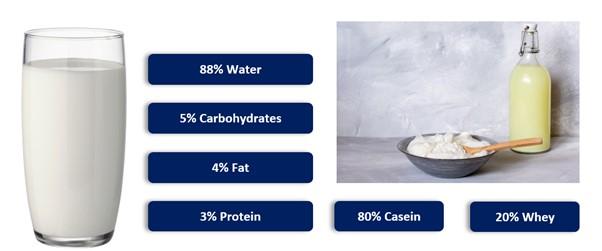 |||
5 minutes
|||
5 minutes
Benefits of Taking Whey Protein on an Empty Stomach
What is the best time to take whey protein is a bit of controversial topic. A lot of people still believe that you must consume whey shake within 30-60 minutes after workout, the time known as anabolic window, however there is no concrete evidence to prove this theory. In fact, whey protein can be consumed at any of the following occasions-
When to consume whey protein-
- First Thing in The Morning
- Pre/Post Workout
- Between Meals (as a snack)
- Any Time of The Day (that is convenient for you)
What is whey protein?
Milk contains two proteins, whey and casein. In terms of macronutrients, whole milk is comprised of 88% water, 5% carbohydrates, 4% fat and 3% protein. Whey protein is found in dairy. From that protein, 20% is whey and the remaining 80% is casein.

Of the two dairy proteins, Casein is slow digesting and whey is the faster digesting protein.
Breaking Fast with a Protein
When you are sleeping you are technically fasting and when you wake up in the morning you are already in the state of catabolism. Catabolism is the state when your body is actively breaking down as opposed to the fed state when your body builds itself up. Your blood pool of amino acids is depleted which also means your body starts breaking down some of the muscles as well. And this is a normal and usual phenomenon.
Drinking protein on empty stomach during breakfast helps set the tone for rest of the day by getting you the jumpstart on the daily protein intake.
Add protein powders as a breakfast boost. Protein powders can easily be mixed into some of your go-to morning foods or beverages. Mix protein powder into your morning coffee, matcha tea, chai tea or steamed latte. Add protein to batter to create breakfast favourites like pancakes, waffles, crepes, muffins, banana bread, and donuts. Mix into yogurt parfait, avocado toast, overnight oats or homemade granola bars. Getting a balanced breakfast can help set the tone for the rest of the day. Pro tip: Balance out your breakfast with carbohydrates plus protein.
Whey At Breakfast Can Reduce Appetite at Lunch
The milk you pour over breakfast cereal contains both whey and casein proteins. A University of Guelph study published in the Journal of Dairy Science found that milk with breakfast can reduce concentrations of blood sugars after consuming the lunchtime meal.
Thirty-two subjects had milk, high-protein whey or water as part of a high-carbohydrate breakfast. All ate pizza for lunch. Milk consumption helped reduce blood sugar levels after the lunchtime pizza, and the effect was greater with whey protein at breakfast. There was also a modest decrease in pizza consumption when whey was consumed at breakfast.
It’s essential that all healthy adults consume adequate amounts of protein throughout each day to help meet protein needs and help support muscle recovery. Always approach diet with a food-first. If protein needs are unmet through food alone, then whey protein supplements can be utilized to help meet your protein needs. How you use whey protein is entirely up to you. The time you decide to use whey protein depends on you and your goals. Whey protein can be used first thing in the morning, between meals, around activities, with meals, before bed and much more. Find what works best for you. Here are three simple tips to help add whey protein to your daily routine –
Track your protein intake to ensure you’re meeting your daily needs.
Find opportunities throughout the day where protein may be missing – including post-workout.
Aim for 20-40 grams protein throughout the day among meals and snacks.
Take Home Message
Taking whey first thing in the morning as a part of a balanced, carbohydrate containing breakfast can not only help you get a jump start on meeting daily protein intake but might also prevent you from overeating later on that day.
